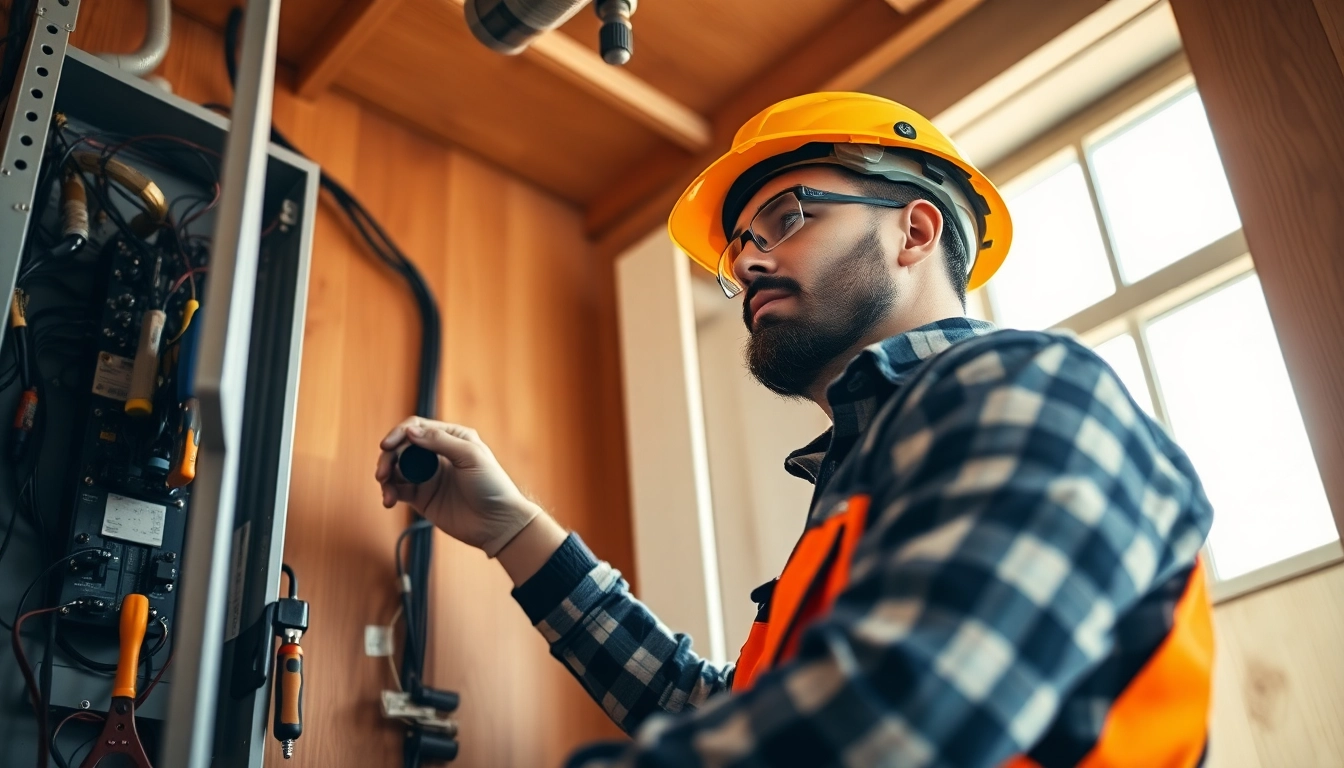
Understanding Electrical Panel Upgrade Necessity
Electrical panel upgrades are a crucial consideration for homeowners wanting to modernize their electrical systems, ensure safety, and accommodate an increasing demand for power. Whether you’re moving into an older home or upgrading your existing electrical system, understanding when and why to consider an Electrical Panel Upgrade is essential for maintaining a safe and efficient home. In this comprehensive guide, we will discuss the signs that indicate an upgrade may be necessary, the importance of upgrading for safety, and the benefits of high-amperage panels. Dive in to discover how an upgrade can transform your electrical experience.
Signs You Need an Electrical Panel Upgrade
Identifying when it’s time to upgrade your electrical panel is vital for the safety and functionality of your home. Here are some common signs that an electrical panel upgrade is necessary:
- Frequent Circuit Breaker Trips: If you find yourself constantly resetting breakers or tripping circuits, this indicates your current panel may be overloaded.
- Flickering Lights: Flickering or dimming lights, especially when significant appliances are in use, can suggest that the panel is struggling to deliver the required power.
- Inadequate Amperage: Homes built decades ago often feature panels rated between 60-100 amperes. Upgrading to at least a 200-amp system is advisable, particularly for modern appliances and technology.
- Old or Damaged Panel: If your panel is more than 20 years old or shows signs of rust, corrosion, or cracking, it may be time for an upgrade.
- Installation of New Appliances: Adding new devices such as electric vehicles (EVs), central air conditioning, or home entertainment systems often requires additional capacity.
The Importance of Upgrading for Safety
Old electrical panels can pose significant safety risks. Faulty wiring and outdated technologies may increase the risk of electrical fires, which can have devastating consequences for your home and family. By upgrading, you enhance safety through the following:
- Increased Protection: Modern panels come equipped with advanced circuit breakers and ground fault circuit interrupters (GFCIs) that dramatically lower the risk of electrical fires.
- Compliance with Current Codes: Electrical codes change over time to reflect new safety standards. Upgrading ensures compliance with local and national codes, protecting your family and property.
- Better Overload Management: Newer panels handle excessive loads more efficiently, reducing the risk of overheating or damage to the electrical system.
Benefits of High-Amperage Panels
Upgrading to a high-amperage panel (200 amps or more) provides immense benefits for homeowners, particularly in today’s tech-driven world:
- Increased Power Capacity: This enables you to run multiple appliances simultaneously without tripping breakers, accommodating a modern lifestyle.
- Future-Proofing: A higher capacity panel integrates future electrical needs, such as EV chargers or home automation systems, providing greater flexibility and peace of mind.
- Improved Resale Value: Potential buyers appreciate modern electrical systems, making homes with upgraded panels more appealing and valuable.
Cost Factors for Your Electrical Panel Upgrade
Average Costs and What to Expect
The cost of upgrading an electrical panel can vary significantly based on several factors, including size, type, and local labor costs. Typically, homeowners can expect to pay between $800 and $4,000 for an upgrade. Here are some averages:
- Upgrading from a 100-amp to a 200-amp panel generally costs around $1,300 to $3,000.
- For a complete installation, including new wiring and circuits, costs may escalate to $4,000 or higher, depending on complexity.
- Don’t forget to factor in potential permits, inspections, and unexpected repairs which may add additional expenses.
Hidden Costs in Electrical Panel Upgrades
While it’s essential to have a budget in place, be prepared for unexpected costs surrounding your electrical panel upgrade. Some hidden costs may include:
- Permit Fees: Local municipalities often require permits for electrical work, adding to your costs.
- Upgrading Wiring: If existing wiring cannot handle the new amperage, additional rewiring will be necessary.
- Inspection Fees: Depending on local regulations, an inspection fee may be charged to ensure compliance with local codes.
- Emergency Repairs: Gaps in your electrical system may require emergency solutions that can drive up costs unexpectedly.
Comparison of Upgrade Options
When considering an electrical panel upgrade, evaluate the types of panels available. Here are some options to consider before moving forward:
- Standard Circuit Breaker Panels: These are the most common choice for residential upgrades and are generally the most cost-effective.
- Smart Panels: These modern panels come with smart technology for remote monitoring and management, providing greater control over your energy use.
- Sub Panels: Installing a sub-panel may be beneficial for larger homes, or homes with extensive appliances that require dedicated circuits.
Do-It-Yourself vs. Hiring a Professional
Assessing Your Skill Level
One of the biggest decisions you’ll face when upgrading your electrical panel is whether to attempt the work yourself or hire a professional. Your skill level plays a vital role in this decision:
- Experience: If you possess a background in electrical work or hold a relevant license, you might consider tackling the upgrade yourself.
- Complexity: For most homeowners, electrical panel upgrades are complex and potentially hazardous, making professional help advisable.
- Time Constraints: If you have limited free time or are unfamiliar with electrical systems, a professional could expedite the process safely.
Benefits of Professional Service for Your Electrical Panel Upgrade
Hiring an experienced electrician for your panel upgrade offers many advantages:
- Safety Assurance: Electrocutions and fires are serious risks associated with DIY electrical work. Professionals understand safety standards and procedures.
- Quality and Compliance: Professionals are knowledgeable of current codes, ensuring your upgrade meets local requirements.
- Efficiency: Expert electricians can complete upgrades much faster than the average homeowner, reducing disruption to your daily life.
Common DIY Mistakes to Avoid
For those inclined to DIY, several pitfalls can detrimentally affect your project:
- Neglecting Permits: Failing to obtain necessary permits can result in fines or required modifications later on.
- Underestimating Load Requirements: Misjudging your household’s electrical load can lead to inadequate capacity, causing further issues.
- Inadequate Safety Measures: Skipping safety precautions can expose you and your home to significant risks.
Permits and Regulations for Electrical Panel Upgrades
Understanding Local Building Codes
Electrical building codes vary by location, and understanding these regulations is vital for any panel upgrade. Local codes are established to ensure safety and reliability. Common code requirements include:
- Panel location and accessibility.
- Clearance and working space around the panel.
- Proper grounding and bonding of electrical systems.
Permitting Process in Your Area
The permitting process for electrical upgrades typically includes these steps:
- Visit your local building department’s website or office to learn about the required permits for electrical work.
- Fill out and submit the necessary forms, including details about your current panel and the intended upgrade.
- Pay applicable fees, which may vary based on the scope of your project.
- Schedule an inspection if required; a building inspector will assess your work for compliance to safety and code standards.
Inspections and Compliance Requirements
Inspections are crucial in ensuring that your electrical panel upgrade is safe and compliant. After the installation, you’ll need to schedule an inspection with local authorities:
- The inspector will check wiring, grounding, and panel installation against local codes.
- Address any issues identified during the inspection before obtaining final approval.
- Good documentation and approved plans should be kept for future reference, particularly for home sales.
Long-Term Maintenance After Your Electrical Panel Upgrade
Regular Inspection and Testing
An electrical panel upgrade significantly improves your home’s electrical system, but ongoing maintenance ensures continued safety and efficiency. Regular inspections every 1-2 years are recommended to:
- Check for signs of wear and damage.
- Test circuit breakers and connections for proper function.
- Verify that your system is up to date with current electrical codes and standards.
Improving Energy Efficiency Post-Upgrade
Upgrading your electrical panel not only enhances capacity but also presents an opportunity to improve energy efficiency. Consider these tips:
- Leverage Energy-Efficient Appliances: Invest in appliances that consume less power, contributing to long-term savings on energy bills.
- Smart Technology: Integrating smart home technology controls allows for optimized energy usage and smart monitoring.
- Regular Maintenance: Keep all systems within the electrical panel clean and operational through periodic checks and maintenance.
Signs of Electrical Issues to Monitor
After your panel upgrade, vigilance for potential electrical issues remains essential. Keep an eye out for:
- Inconsistent Power Supply: Noticeable fluctuations in power supply can indicate deeper issues requiring attention.
- Strange Smells or Sounds: Burning odors or unusual noises coming from the panel signal immediate action.
- Frequent Breaker Trips: A switch that continues to trip post-upgrade indicates potential issues with wiring or overloaded circuits.
By understanding the factors behind an electrical panel upgrade and following best practices outlined here, homeowners can elevate their electrical safety and performance. Investing in an upgrade not only enhances your home’s functionality but assures a safer environment for you and your family.







